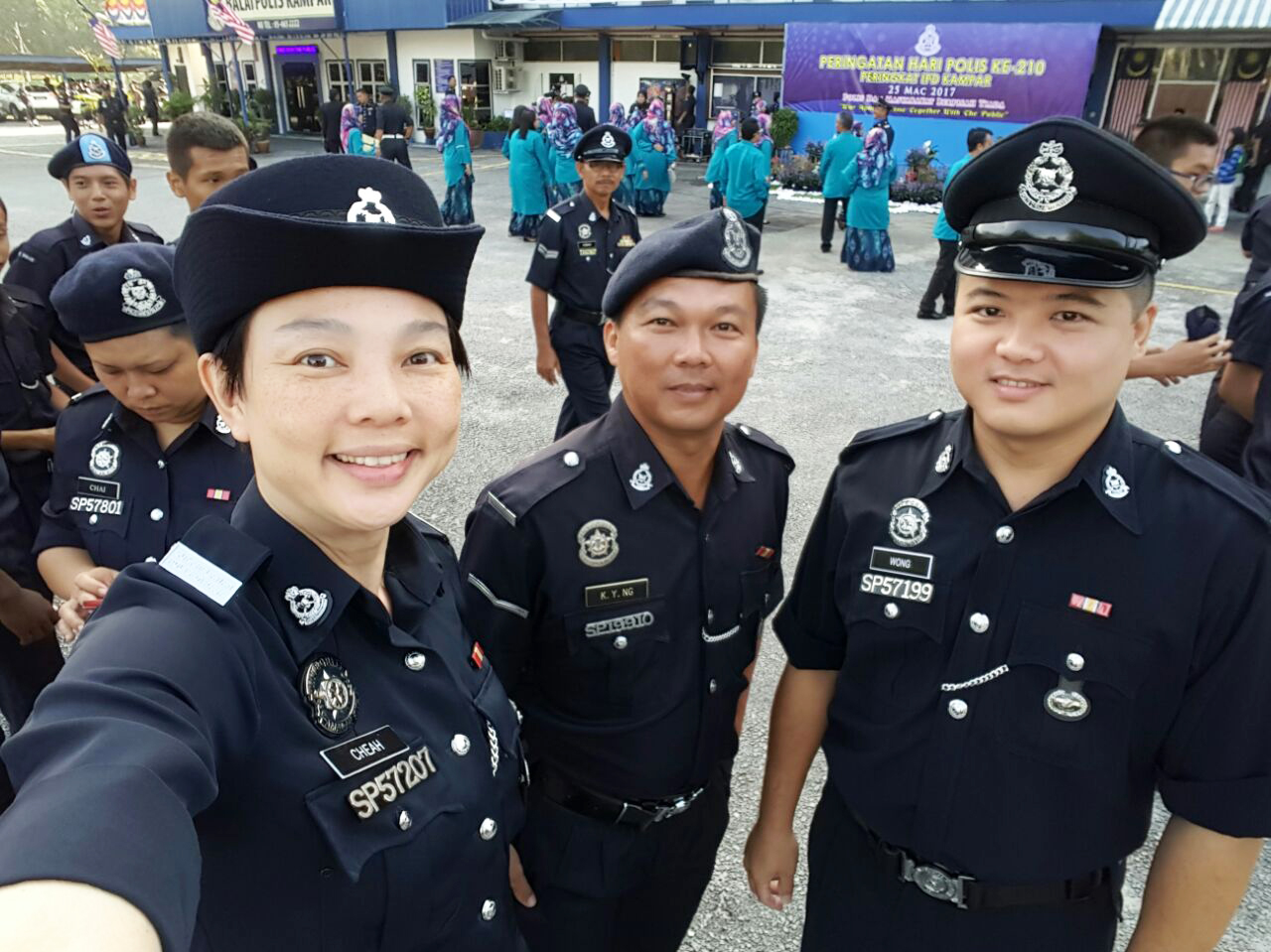

Dr Cheah (far left) with other PVR officers during the Kampar District Police Headquarters’ Police Day celebration in 2017
Faculty of Arts and Social Science (FAS) Department of Public Relations Assistant Professor Dr Cheah Phaik Kin recently authored the first ever published study on the Malaysian Volunteer Police (PVR) or Sukarelawan Simpanan Polis diRaja Malaysia (SPDRM).
Her paper titled “Role reflections of police reservists: A study of volunteer reserve officers in Malaysia” was published online first in May 2018 in Policing: An International Journal by Emerald Insight, a global publisher linking research and practice. The paper was co-authored by Prof Dr Prabha N. Unnithan from the Colorado State University, USA and the Assistant Commissioner of Police of Royal Malaysia Police (PDRM) of Ipoh, Perak Suresh Kumar G. Suppiah.
The principal investigator of the paper, Dr Cheah explained that the article was a good starting point to lead to more studies on volunteer policing in Malaysia. In this study we conceptualised the role orientations of PVRs using a qualitative approach.
She said, “Since joining the police force as a volunteer reserve constable in 2014, I felt that the PVR was a vital part of the PDRM. The purpose of my participation in the force was to contribute to the society, community and the country. Apart from PVR duty, I also wanted to explore other ways that I can contribute by using my professional skills as a social scientist. My fellow PVR officers comprised people from all walks of life. They come from very diverse backgrounds with valuable knowledge and skills. Given this rich diversity, the PVR team serves as a valuable resource in the police force. So each of us just do what we can, in our own little way to contribute. This paper also serves as a credible record about the PVR in Malaysia.”
She added, “On the home front, the University also recognised the potential of this research project when we applied for funding through the UTAR Research Fund, without which we would not be able to execute the project. It was also enlightening for the FAS undergraduate students whom we trained through the university's undergraduate research scheme (URS). They had to brave themselves into police stations in the process of conducting this study. For them, the experience was indeed eye-opening.”
When asked about the significance of the research to her career as a lecturer and as a researcher, she described, “The role of a researcher and lecturer is to create, innovate and impart wisdom to the students. By being a researcher, we also learn to better ourselves and develop our knowledge and skills to become a better educator. Because there was a knowledge gap on the PVR in Malaysia, studying the PVR would help policy makers, decision-makers at all levels, trainers and also administrators gain a better understanding of the PVR and their roles on the ground. It was found in a past study that it was rare to have police practitioners as researchers. Thus, in this project we have two authors who hold dual roles as a regular police and researcher, and a PVR and researcher. This provides a very good combination of practice and scholarship.”
She added, “I took on this project because there was a void. During my police training, I was trying to read up on the PVR and understand the organisation and the work. It was then that I realised this knowledge gap. There was limited information when I ran a Google search on PVR in Malaysia apart from news reports, social media posts and law books. This study produced a model detailing four role orientations of the PVR. These role orientations were based on a qualitative study. Therefore, the results may not be generalised. But because it is the first study done on the PVR, this study is significant because it provides an insight into the roles of the PVR. Data was collected from a purposive sample to gain a true reflection of the roles played by PVR officers in Malaysia.”
Dr Cheah is grateful to the Perak Police Contingent for supporting the study. “My co-researchers and I also appreciate the support from Kampar District Chief of Police Superintendent Ng Kong Soon, Pegawai Turus Koordinasi Sumber Sokongan Supt Noraziah binti Zakaria, Perak State PVR Commandant Superintendent Ore Hock Seng, Administration Officer in the Perak State PVR Commandant's Office Inspector Yong Chin Kuen and UTAR Senior Librarian Chang Tiam Chau. Lastly, this study would not have been possible without the respondents who had participated voluntarily in the study,” she said.
Since the publication of the study, her research project also gained
recognition from a US-based international Volunteer Law Enforcement
Officer Alliance (VLEOA) where her video was also posted in their
newsfeed here:
https://www.policereserve.org/the-magazine
Dr Cheah’s PVR journey was also published here:
https://www.thestar.com.my/news/nation/2014/12/28/when-the-going-gets-tough-as-the-government-embarks-on-a-campaign-to-encourage-more-nonbumiputras-to/
Click here to read Dr Cheah’s journal article:
https://www.emeraldinsight.com/doi/abs/10.1108/PIJPSM-05-2017-0065
© 2019 UNIVERSITI TUNKU ABDUL RAHMAN DU012(A).
Wholly owned by UTAR Education Foundation Co. No. 578227-M LEGAL STATEMENT TERM OF USAGE PRIVACY NOTICE